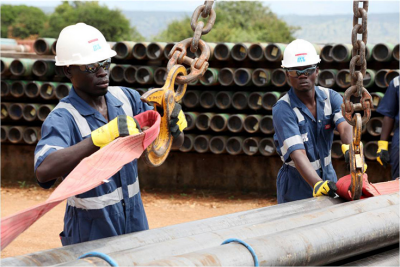
- The recent discovery of oil reserves can provide Uganda with long-term positive impacts on the economy if handled strategically, according to a new World Bank report
- The report also explores constraints to developing the oil and gas industry, including limited access to finance for small-medium enterprises
- The report also presents opportunities for the World Bank to support the country in its transition into high-quality exports to regional and international markets
The study, Leveraging Oil and Gas Industry for the Development of a Competitive Private Sector in Uganda, recommends that the oil and gas sector be leveraged for domestic private sector development by developing local suppliers and related industries.
Sajjad Shah, World Bank acting country manager for Uganda, said that the discovery of oil resources offers a unique opportunity to develop the Ugandan economy.
“Oil revenues can be used to finance priority domestic investments crucial for diversified growth,” Shah said. “Even before oil production commences and oil revenues start coming in, local enterprises can participate in supplying the industry and start growing their business and the national economy in general.”
The report also focuses on diagnosing the constraints, including access to finance, for local small-medium enterprises (SMEs) to enter into the oil and gas supply chains and highlights some case studies on how best to overcome these constraints.
The report notes that SMEs usually need to scale up their businesses significantly and/or buy specialized equipment to meet the high quality standards needed to participate in such a capital-intensive and quality conscious industry such as oil and gas. But securing financing is a challenge for SMEs, as many do not know the basics of the process, including how to prepare a business plan, which is required by financial institutions.
SMEs are also perceived as “high risk” by financial institutions, as there is little information available on their operations; SMEs do not have audited financial statements and credit bureau coverage is very limited in Uganda. To compensate, banks demand high levels of collateral, predominantly immovable, which most SMEs do not have, said Valeriya Goffe, a World Bank finance and private sector development specialist in the World Bank Finance and Markets Global Practice, and lead author of the report.
“Special financing mechanisms are needed to overcome the challenges of inadequate collateral and the higher perceived risk of lending to SMEs,” she said. “Efforts to address both supply and demand-side challenges are required in this case. For example, lines of credit could be provided to banks to expand the pool of available long-term finance and also increase lending for priority areas, such as oil and gas. Risk-sharing facilities could be utilized to address the issues of inadequate collateral, while capacity-building programs for entrepreneurs would be essential to make them more ready to apply for financing.”
The report also highlights examples to follow in the Albertine Region, such as the NGO Traidlinks in Hoima District, which has helped local farmers seize opportunities coming from the oil development by supplying fresh fruits and vegetables to the oil camps.
“Similar initiatives could be set up in other districts such as in the Buliisa district to benefit more farmers,” said Goffe.
The report also provides alternative approaches, including having large scale investors establish operations to produce food demanded by oil camps and use smallholders as outgrowers or contract farmers.
“There is a need to fast-track the development of skills and expertise and ensure national participation in the sector for which the National Content Policy provides the key framework,” said Fred Kabanda, Principal Geologist and Head Regulatory Unit, Petroleum Exploration and Production Department, Ministry of Energy and Mineral Development, on behalf of the Permanent Secretary. “The National Content Policy will guide the government, licensees, operators, oil service companies and other key stakeholders in the identification, planning, implementation, monitoring and evaluation of National Content development in the country.”
The report outlines multiple opportunities for the World Bank to support the country in its transition into high-quality exports to regional and international markets. These include providing a line of credit for local SMEs to scale-up their ability to supply goods and services to the oil and gas sector, capacity building for entrepreneurs and government ministries, and the establishment of an agro-industrial park to jumpstart the food processing sector in the economy.
FRENCH VERSION
La découverte de 6,5 milliards de barils de pétrole réserve, dansla région de Albertine ougandais présents, l’occasion pour lepays de générer des recettes publiques pour l’investissementintérieur et catalyser le développement du secteur privé.Toutefois, les réserves de pétrole représentent un avantagetemporaire, tirés des réserves de pétrole sera finies. Mais leurimpact sur l’économie ougandaise et de la société, si déployéstratégiquement, pourrait être beaucoup plus long terme, selonun nouveau rapport de la Banque mondiale.


